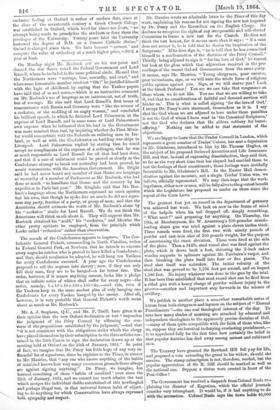On Monday night Mr. Roebuck put on his war-paint and
danced the war dance round the Federal Government and Lord Russell, whom he included in the same political circle. He said that the Northerners were " corrupt, base, cowardly, and cruel," and when some honourable member cried out " Oh !" he justified himself with the logic of childhood, by saying that the Yankee papers have said that of us and worse,—which is an instructive comment on Mr. Roebuck's use of language as an instrument, not of truth, but of revenge. He also said that Lord Russell's first tones of remonstrance with Russia and Germany were "like the scream of a cockatoo, or the scolding of an angry woman," and concluded his brilliant speech, in which he flattered Lord Palmerston at the expense of Lord Russell, and in some sense at Lord Palmerston's own expense when he intimated that his lead in the Government was more nominal than real, by inquiring whether the First Minis- ter would remonstrate with the Federals on enlisting men in Ire- land, as well as with the Confederates on building war-ships in Liverpool. Lord Palmerston replied by stating that he could accept no compliments at the expense of a colleague, that he was as much responsible as Lord Russell for all that had been done, and that if a case of enlistment could be proved as clearly as the Confederate attempt to break our neutrality had been proved, he would remonstrate with the American Government. Mr. Bright said he had never heard any member of that House use language so unworthy of a member of Parliament as Mr. Roebuck, who had done so much "to humiliate that House and the country by his expedition to Paris last year." Mr. Kinglake said that Mr. Roe- buck's language about the Northerners expressed no one's opinion but his own, that though he spoke like an oracle he did not repre- sent any party, fraction of a party, or group of men; and that the Americans should estimate the worth of Mr. Roebuck's abuse by his " cockatoo " simile for Lord Russell. We do not think the Americans will think much about it. They will suppose that Mr. Roebuck obtained his " scold," his " cockatoo," and likewise the other pretty epithets he employed, from the principle which Locke called "reflection" rather than observation.


































 Previous page
Previous page